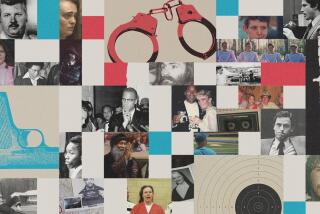Pleading Guilty--to Believing in Kimble and His Sense of Right
- Share via
Those rapists and murderers who make up “America’s Most Wanted” are starting to give fugitives a bad name.
True, Dr. Richard Kimble was tried, convicted and sentenced to death, just like some of the scum on the Fox Broadcasting show. But please don’t hold that against him when you watch reruns of the “The Fugitive.” This is one hunted man who is innocent.
Like some of those other convicts, Kimble escaped. But not by taking hostages or bribing a guard. He was, as William Conrad’s booming voice reminds us every night before the credits, “reprieved by fate when a train wreck freed him en route to the death house.” Freed him to go from town to town, straighten out a lot of lives, go through a lot of suitcases. Freed him to dye his gray hair black and let that awful crew cut grow out.
It’s a good thing that he finally caught up with the one-armed man--the real murderer of his wife, Helen--in the ‘60s. An honest fugitive would have had a rough time of it in the ‘80s. Not only would he have been dogged by high-tech police and by viewers of “America’s Most Wanted,” but by values that are out of place.
He is not simply a small-town doctor--but a small-town pediatrician. His fight with his wife--a nurse--before the murder was not over money or another woman but children . (After she miscarries, he wants to adopt. She doesn’t).
Kimble isn’t even a good liar--his mouth twitches when he gives a bogus name or hometown.
He has had plenty of chances to go to Brazil with a fabulous babe and a bag full of money, but he can’t clear his name from South America. From South America, he can’t bring the one-armed man to justice.
Today, that kind of hero would be laughed off TV--unless he turned into a werewolf or Lou Ferrigno. But back in 1963, his was the kind of story you could believe: A good man, convicted of something he didn’t do, on the run, stopping only to catch his breath, make a few bucks and help out a few people.
In one town, he’s a substitute father to a workaholic’s son; in another, a friend to an awkward heiress. He’s a guy who will stick around where it’s not safe, to help a troubled boy, deliver a baby or keep an innocent vagrant from a murder rap.
That sense of right is what makes Kimble have the worst--and best--luck imaginable.
When he rescues a girl from an escaped criminal (who, of course really is guilty), he gets hurt himself--and winds up in a prison hospital, which makes him very nervous, makes that fugitive twitch go full speed.
Another time, just steps ahead of the Jalvert-like policeman Philip Gerard, he jumps into a car and takes off--only to realize that Gerard’s son is hiding in the back seat. But does he abandon the kid?
Not a chance.
Even if he is often in the wrong place at the wrong time, by the end of the hour he is in the right place because, as Gerard laments, “people--decent people--will hide him, lie for him.” He saves some school kids from a burning bus, but then his identity is discovered and he ends up locked in jail--and the wife of a cop slips him the key. Some people go as far as to confess to Helen’s murder for him.
Even Helen’s bitter mother, who is obsessed with the memory of her murdered daughter and who loathes Kimble, ends up helping him hide from the police.
Only the vilest of characters can believe that Kimble is guilty. The better the man, the faster he knows that Kimble is no killer.
He is, however, not always a saint.
He was close to it in ‘63, when he was quick to give up without a fight. In later years, he was just as quick to escape from a cop by punching him out. The lying gets a little easier, and so do other sins.
When he finds himself on a train full of prison guards and cops--and his money missing--he steals a wallet so he can pay his fare. But his misdeeds always spring from desperation, never from greed or laziness. That is probably why it’s not the lifting of the wallet that gets him in trouble, but his insistence on getting the three bucks back to his victim. Today he wouldn’t be a hero, he would be a sap.
So why would anybody bother to tune in nowadays?
Maybe to get a few laughs out of seeing Southern California being passed off as Montana or Maine.
Or maybe because we have seen one too many of those glib, irritating comedy-dramas this season.
Or maybe, just maybe, it’s because we like to think that if we were in the spot that Kimble is in, we would have the guts to be a sap, too.
That thought is probably a fleeting one, though. We’re a little more practical this decade.
Besides, for Richard Kimble to have survived on TV in the ‘80s, he would have to get some fake ID, including a driver’s license. Hitchhiking is too dangerous for non-murderers, and there aren’t that many buses you can flag down in the middle of the highway anymore.
He would have to give up cigarettes and maybe work out a little bit. And the show’s star would have to do his own stunts. And maybe direct a few episodes.
But most important, Kimble would have to wise up. Quit helping any poor slob that’s in trouble. No more saving Gerard’s life. And forget that one-armed man. Just win some lottery money, leave the country and wait until they’ve forgotten about that unspectacular murder. That’s what a smart ‘80s fugitive would do, guilty or not.
More to Read
Sign up for Essential California
The most important California stories and recommendations in your inbox every morning.
You may occasionally receive promotional content from the Los Angeles Times.













